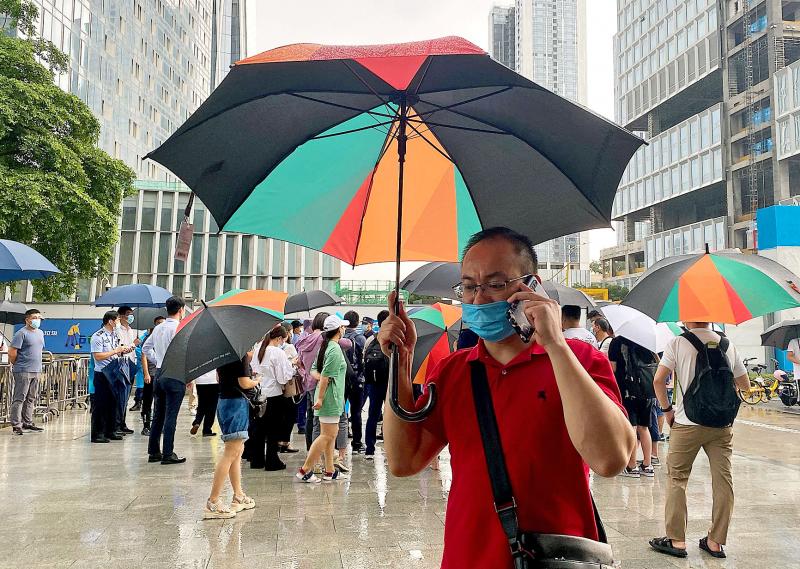Dozens of people yesterday protested outside the headquarters of Chinese property giant Evergrande Group (恆大集團) after the debt-laden firm said that it was under “tremendous pressure” and might not be able to meet its repayments.
The Hong Kong-listed developer is sinking under a mountain of liabilities totaling more than US$300 billion after years of borrowing to fund rapid growth.
The group was downgraded by two credit rating agencies last week, while its shares tumbled below their 2009 listing price, with a barrage of bad headlines and speculation of its imminent collapse on Chinese social media.

Photo: AFP
An estimated 60 to 70 people gathered outside Evergrande’s headquarters in Shenzhen, China, jostling with police and demanding answers.
Some were contractors owed money, others anxious investors, reporters at the scene said.
“Our boss is owed over 20 million yuan [US$3.1 million] and many people here are owed even more,” a man who gave his surname only as Chen (陳) told reporters. “We are definitely very anxious. There’s no clear explanation right now ... they should have paid the money when it was due.”
Evergrande’s plight has raised fears of a contagion across the debt-mired Chinese property sector — which accounts for more than one-quarter of the world’s second-largest economy — with a knock-on effect on banks and investors.
On Monday, the company said that it would avoid bankruptcy.
However, it issued another statement yesterday to the Hong Kong stock exchange, saying it had hired financial advisers to explore “all feasible solutions” to ease its cash crunch.
The statement warned that there was no guarantee Evergrande would meet its financial obligations.
The firm blamed “ongoing negative media reports” for damaging sales in the pivotal September period, “resulting in the continuous deterioration of cash collection by the group, which would in turn place tremendous pressure on ... cashflow and liquidity.”
Shares in the firm fell more than 11 percent yesterday and are down almost 80 percent since the start of the year.
The company has about 1.4 million properties that it has committed to complete — about 1.3 trillion yuan in pre-sale liabilities as of the end of June — an estimate by Capital Economics said.
“Evergrande’s collapse would be the biggest test that China’s financial system has faced in years,” Capital Economics lead Asia economist Mark Williams said.
Yet “markets don’t seem concerned about the potential for financial contagion at the moment,” Williams said, adding “that would change in the event of large-scale default,” which would likely prod the People’s Bank of China to step in and buttress the teetering developer.
“The most likely endgame is now a managed restructuring in which other developers take over Evergrande’s uncompleted projects in exchange for a share of its land bank,” he said.
The pictures of angry investors outside the firm’s headquarters could also cause alarm in Beijing, where leaders are keen to keep a lid on social unrest.
Some creditors have demanded immediate payback of loans, Bloomberg News reported earlier this month.
Evergrande has already sold stakes in some of its wide range of assets and offered steep discounts to offload apartments, but still reported a 29 percent slide in profit for the first half of the year. It is also struggling to sell its Hong Kong headquarters, even at a loss.

Intel Corp chief executive officer Lip-Bu Tan (陳立武) is expected to meet with Taiwanese suppliers next month in conjunction with the opening of the Computex Taipei trade show, supply chain sources said on Monday. The visit, the first for Tan to Taiwan since assuming his new post last month, would be aimed at enhancing Intel’s ties with suppliers in Taiwan as he attempts to help turn around the struggling US chipmaker, the sources said. Tan is to hold a banquet to celebrate Intel’s 40-year presence in Taiwan before Computex opens on May 20 and invite dozens of Taiwanese suppliers to exchange views

Application-specific integrated circuit designer Faraday Technology Corp (智原) yesterday said that although revenue this quarter would decline 30 percent from last quarter, it retained its full-year forecast of revenue growth of 100 percent. The company attributed the quarterly drop to a slowdown in customers’ production of chips using Faraday’s advanced packaging technology. The company is still confident about its revenue growth this year, given its strong “design-win” — or the projects it won to help customers design their chips, Faraday president Steve Wang (王國雍) told an online earnings conference. “The design-win this year is better than we expected. We believe we will win

Chizuko Kimura has become the first female sushi chef in the world to win a Michelin star, fulfilling a promise she made to her dying husband to continue his legacy. The 54-year-old Japanese chef regained the Michelin star her late husband, Shunei Kimura, won three years ago for their Sushi Shunei restaurant in Paris. For Shunei Kimura, the star was a dream come true. However, the joy was short-lived. He died from cancer just three months later in June 2022. He was 65. The following year, the restaurant in the heart of Montmartre lost its star rating. Chizuko Kimura insisted that the new star is still down

While China’s leaders use their economic and political might to fight US President Donald Trump’s trade war “to the end,” its army of social media soldiers are embarking on a more humorous campaign online. Trump’s tariff blitz has seen Washington and Beijing impose eye-watering duties on imports from the other, fanning a standoff between the economic superpowers that has sparked global recession fears and sent markets into a tailspin. Trump says his policy is a response to years of being “ripped off” by other countries and aims to bring manufacturing to the US, forcing companies to employ US workers. However, China’s online warriors